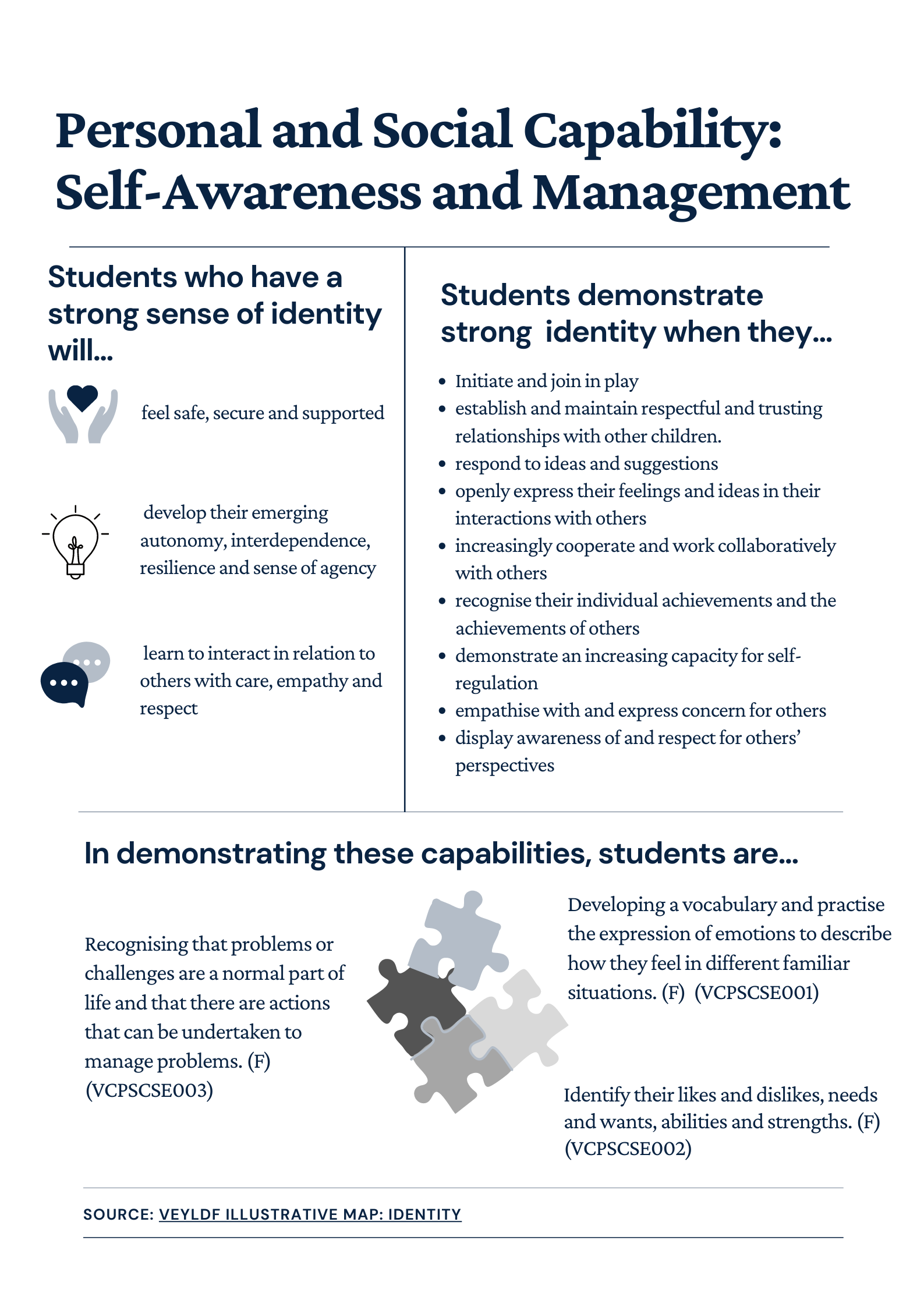Privileging personal and social capabilities
Personal and social capabilities afford students the opportunity to be aware of the self, family and community. Such awareness contributes to children’s connectedness, acceptance and experience of positive reciprocal relationships.
Having a repertoire of prosocial behaviours is an important personal and social capability that contributes to students’ success in group situations, including friendships and classroom experiences (VCAA, 2019). In particular, the ability to self-regulate emotions, collaborate with, and resolve conflict are just three prosocial skills that are essential for students’ reciprocal relationships with peers and engage in classroom experiences.
Porter (2016) notes that when young students develop a range of prosocial skills, they are more likely to build positive relationships with peers. These peer relationships promote students’ feelings of belonging and acceptance, as well as positive self-esteem. Collectively, these personal and social capabilities and dispositions contribute to students being more likely to engage, learn and succeed in school.
Reflecting on Module 1
As discussed in Module 1, play-based and inquiry learning provides a way for students to practice, re-enact, and master a range of emotional and social ideas, feelings and experiences, to support their personal and social capabilities.
For example, when students take on the role of someone else in imaginary and dramatic play, they explore a range of emotions that support their capacities for empathy, abstract levels of thought and reflection, and prepare them emotionally and intellectually for the future (Wieder, 2017). These capabilities are important for students’ self-awareness and social awareness.
Metacognitive and self-regulatory skills
Students also develop metacognitive and self-regulatory skills that are important for higher-order thinking, creativity, planning and evaluating learning, and problem-solving (Whitebread, Coltman, Jameson & Lander, 2009). These are capabilities that are important for students’ self-management and social management.
In all types of play and inquiry experiences, students are involved in collaboration with peers which facilitates friendships, promotes pro-social behaviours and attitudes, and fosters the experience of responding to peer suggestions and resolving conflict (Scott & Panksepp, 2013).
In terms of social skills, it is important to be alert to the contribution of culture and language to learning. Barblett and Maloney (2010) note when assessing social skills, teachers need to understand that students bring their own cultural lens to their learning and social experiences which informs the ways they interact with others. While many differences may be well known and obvious, there will be other unexpected areas of divergence.
Aligning the VEYLDF with the Victorian Curriculum
Many of these experiences in play align with student's
Personal and Social Capability Outcomes in the Victorian Curriculum.
In the interactive vodcast below, Dr Natalie Robertson provides an overview of how you may notice personal and social capabilities in student’s play-based and inquiry learning by drawing on the
VEYLDF Learning and Development Outcomes.
Click on the tiles to listen to discussions and think about students’ identity and wellbeing.
Downloadable resource
 Personal and social capability: Self-awareness and Management downloadable PDF
Personal and social capability: Self-awareness and Management downloadable PDF
A downloadable resource has been created that provides you with an illustrative map of how you may assess students’ personal and social capability outcomes through play-based and inquiry learning experiences.
Teachers talk about the assessment of personal and social capabilities
In the video below, teachers from Wales Street Primary School explain how they notice, assess and document students’ personal and social capabilities. As you are watching this video, think about how the teachers are following the process of the VEYLDF Early Years Planning Cycle.